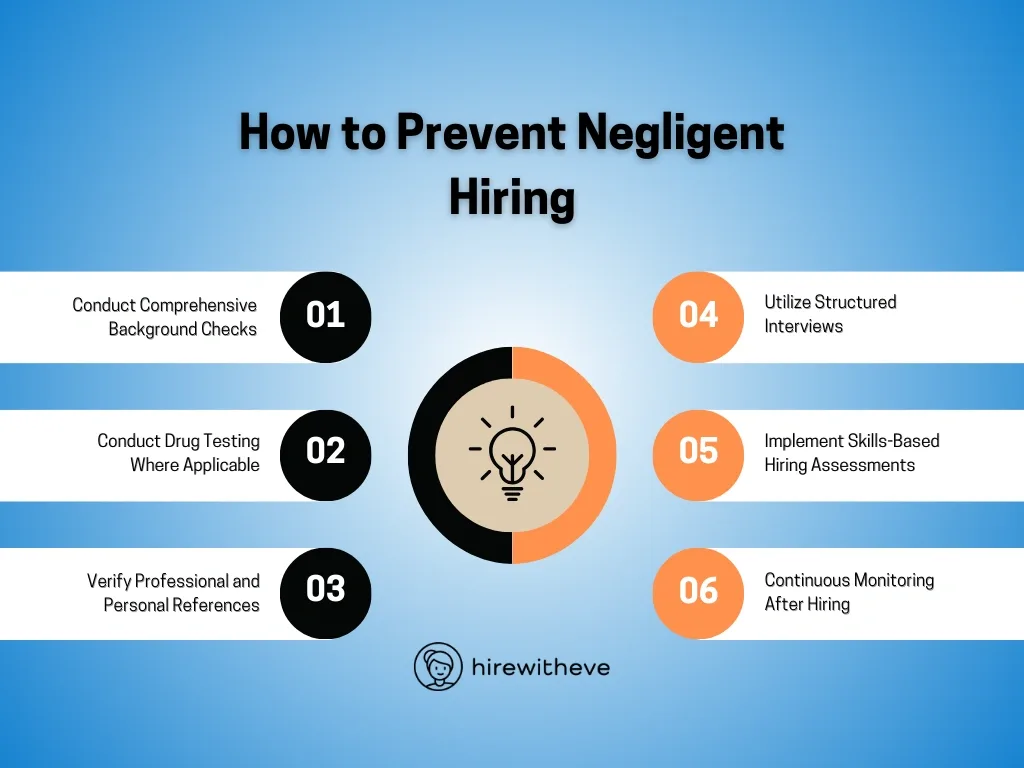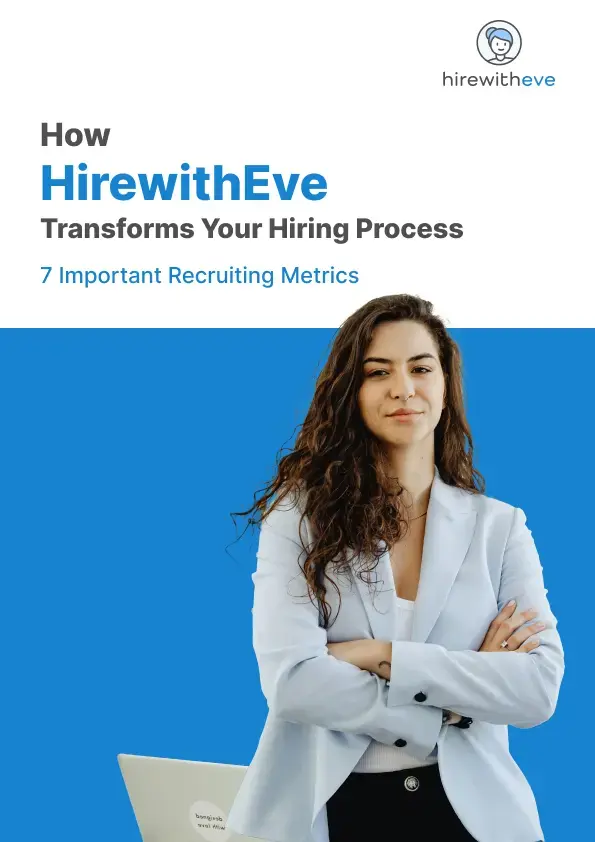What is Negligent Hiring and How to Prevent It?

In the fast-paced world of recruitment, talent acquisition specialists and HR managers must constantly navigate the complexities of finding the right candidates while protecting their organizations from potential risks. One of the biggest risks that hiring professionals face is negligent hiring. But what is negligent hiring, and why is it such a crucial topic for businesses today?
Negligent hiring occurs when a company fails to conduct adequate background checks or screenings on potential employees, leading to the hiring of individuals who may pose a threat to the workplace or customers. This failure can expose businesses to significant legal, financial, and reputational damage. In this blog, we’ll explore what is negligent hiring, its implications, how to prevent it, and why HirewithEve is the best platform for helping organizations mitigate these risks.
Table of contents
What Is Negligent Hiring?
The Legal Implications of Negligent Hiring
How to Prevent Negligent Hiring
Best Practices for Conducting Background Checks
Why HirewithEve is the Best Platform for Preventing Negligent Hiring
Conclusion
What Is Negligent Hiring?
So, what is negligent hiring? In simple terms, negligent hiring is when an employer is held liable for the harmful actions of an employee because they failed to take reasonable steps during the hiring process. This often happens when employers skip important steps such as background checks, reference verification, or skills assessments, which could have identified potential risks associated with the candidate.
For example, if an organization hires a delivery driver without conducting a criminal background check, and the employee later commits a crime while on the job, the employer could be sued for negligent hiring. The lawsuit would argue that the employer did not take the proper precautions to ensure the safety of their customers or other employees.
Negligent hiring is a critical issue that every talent acquisition specialist and HR manager must understand thoroughly. Ignorance of what is negligent hiring can result in catastrophic consequences, including lawsuits, loss of reputation, and even the closure of businesses in extreme cases.
The Legal Implications of Negligent Hiring
Understanding what is negligent hiring is important, but knowing its legal implications is even more crucial. Negligent hiring lawsuits can lead to hefty penalties, as employers are expected to exercise reasonable care in ensuring that their employees do not pose a threat to the safety and well-being of others.
The key element in a negligent hiring case is whether the employer knew or should have known about the potential risk posed by the employee. When companies fail to follow established procedures like background checks, they open themselves up to the risk of legal action. This is why it is essential for HR managers and talent acquisition specialists to be fully aware of what is negligent hiring and how to avoid it.
Negligent hiring can affect businesses across all industries, but it is particularly damaging for organizations that provide services to vulnerable populations, such as healthcare, education, and childcare. However, all businesses, no matter the sector, need to recognize the significance of what is negligent hiring and take steps to protect themselves from liability.
How to Prevent Negligent Hiring

Preventing negligent hiring is not just about minimizing legal risks—it’s about creating a safe and productive work environment. When you understand what is negligent hiring, it becomes clear that every talent acquisition specialist and HR manager must take proactive steps to reduce this risk.
Here are key strategies that you can adopt:
Conduct Comprehensive Background Checks
The cornerstone of any hiring process aimed at preventing negligent hiring is the background check. A thorough background check can reveal information about a candidate’s criminal history, past employment issues, or other red flags that may indicate they are not suitable for the position.
Criminal Records: Checking criminal history is essential, especially for roles where employees will have direct interaction with the public, vulnerable populations, or sensitive company data. Failing to uncover a candidate’s criminal background could expose the company to significant liability.
Employment History Verification: Confirming past employment is crucial. A candidate might falsify their resume to hide gaps in employment or to obscure a problematic work history, such as terminations for misconduct. Verifying the accuracy of a candidate’s job titles, roles, and duration of employment can help ensure that they are who they claim to be.
Education and Credential Verification: In certain fields, particularly healthcare, education, and engineering, confirming the legitimacy of a candidate’s credentials is critical. Fraudulent claims about educational qualifications can lead to hiring an unqualified individual, which may expose the company to operational or legal risks.
Conduct Drug Testing Where Applicable
Drug testing is another important part of preventing negligent hiring. For certain positions, especially in industries like transportation, construction, or healthcare, regular drug testing may be required by law. Even if it's not a legal requirement, including drug testing in the pre-employment process can help reduce the risk of hiring someone who could pose a safety threat to themselves or others.
Verify Professional and Personal References
Reference checks are a valuable tool for gaining insight into a candidate's work ethic, behavior, and past performance. It is crucial to speak with individuals who have worked closely with the candidate, particularly previous supervisors or managers. These references can help you confirm whether the candidate has displayed any concerning behaviors or had issues in previous roles.
Make sure to ask questions that go beyond verifying job titles and dates of employment, such as:
“Did the candidate ever exhibit problematic behavior in the workplace?”
“Was there any reason to believe that the candidate posed a risk to other employees or clients?”
These questions help uncover any red flags that may not have been apparent during the interview process.
Utilize Structured Interviews
Structured interviews, where all candidates are asked the same set of job-relevant questions, can help you avoid biases and ensure that each applicant is evaluated fairly. This reduces the risk of making a hiring decision based on intuition rather than objective assessment. In structured interviews, you can ask targeted questions that help you assess whether a candidate’s behavior aligns with your company’s values and safety standards.
By incorporating structured interviews into your hiring process, you can reduce the risk of hiring someone with behaviors or traits that could contribute to negligent hiring risks.
Implement Skills-Based Hiring Assessments
Skills-based assessments are another critical tool to help mitigate the risk of negligent hiring. These assessments allow employers to focus on the candidate's actual abilities rather than relying solely on their resume or interview performance. By testing candidates on the skills required for the job, you can identify whether they are truly qualified for the position.
Platforms like HirewithEve are particularly beneficial in this area, as they offer skill-based assessments that are designed to evaluate whether a candidate can perform the tasks required for the role. This is a powerful way to minimize the risk of hiring someone who is unqualified and may present safety or performance concerns.
Continuous Monitoring After Hiring
While the focus is often on pre-employment checks, continuous monitoring of employees after they’ve been hired is equally important. Implementing periodic performance evaluations, conducting regular reviews of criminal records for employees in sensitive roles, and maintaining a zero-tolerance policy for workplace misconduct are essential to prevent negligent retention, which is closely related to negligent hiring.
By being proactive about identifying risks both before and after hiring, organizations can avoid the pitfalls of negligent hiring and create a safer, more productive workplace.
Best Practices for Conducting Background Checks
One of the most effective ways to prevent negligent hiring is through thorough background checks. Conducting these checks is crucial to identifying potential red flags that could indicate a candidate may be a risk to your organization. Let’s explore some best practices for background checks to ensure you’re adequately protecting your company from negligent hiring lawsuits.
Compliance with Legal Requirements
When conducting background checks, it's essential to ensure compliance with all local, state, and federal laws. Background check regulations can vary based on location and industry, so HR professionals must be aware of the legal landscape.
For example, in the United States, the Fair Credit Reporting Act (FCRA) regulates how companies can conduct background checks. It requires that employers inform candidates of their intent to conduct a background check, obtain written consent, and provide a copy of the report if adverse action is taken based on the information uncovered. Non-compliance with these laws can lead to legal penalties, so it is critical to ensure that all processes are legally sound.
Additionally, certain jurisdictions may have “ban the box” laws, which prohibit employers from asking about criminal history on job applications. In these cases, criminal background checks can only be conducted after a conditional job offer has been made.
Partner with Reputable Screening Providers
Conducting background checks in-house can be time-consuming and prone to errors. Instead, many companies partner with third-party screening providers who specialize in performing comprehensive background checks. These providers have the resources to conduct thorough checks, including criminal records, employment history, education verification, and even credit reports when applicable.
Working with a reputable provider also ensures that your organization complies with all relevant laws and regulations. The screening company should have a solid track record of accuracy and legal compliance, helping you avoid potential legal issues while getting the critical information you need to make informed hiring decisions.
Conduct Multiple Types of Checks
To prevent negligent hiring, HR professionals should go beyond basic criminal background checks and incorporate other types of screening as well:
Employment History Check: Verify a candidate’s past work experience, including job titles, duration of employment, and reasons for leaving. This helps you confirm that the candidate has been truthful about their qualifications.
Education Verification: Verify the candidate’s educational background, especially for roles that require specific degrees or certifications. Fraudulent claims about education can lead to unqualified individuals being hired.
Credit Check: For roles involving financial responsibilities, a credit check may be warranted. Financial mismanagement in a candidate's past could indicate a risk for certain positions, such as those involving handling sensitive financial information or company assets.
Driving Records: For positions that require driving, such as delivery drivers or transportation workers, reviewing the candidate’s driving record is essential to ensure they have a clean and safe history behind the wheel.
Maintain Consistency in the Background Check Process
One of the easiest ways to prevent claims of discrimination or bias in hiring is to have a standardized background check process that applies to all candidates equally. Whether you are hiring for an entry-level position or an executive role, the same set of checks should be applied consistently across the board.
A lack of consistency can expose your organization to legal challenges, especially if it appears that certain candidates were subjected to different standards based on race, gender, or other protected characteristics. Standardizing the process ensures fairness and transparency.
Get Written Consent from Candidates
Before conducting any background check, it's essential to obtain written consent from the candidate. This is not only a legal requirement in many jurisdictions but also a best practice for maintaining transparency and building trust with potential employees. Candidates should be informed about the scope of the background check, what information will be reviewed, and how the results will be used in the hiring decision.
Evaluate Results Carefully
Once you’ve conducted a background check, it’s important to interpret the results carefully. Not all red flags should result in an immediate disqualification. For example, a criminal record doesn’t necessarily mean that a candidate is unsuitable for the position, context is key. Consider the nature of the offense, how long ago it occurred, and whether it is relevant to the position they are applying for.
Similarly, gaps in employment or less-than-stellar references may not be deal-breakers, depending on the circumstances. Instead, these results should be weighed as part of the overall hiring decision.
Protect Candidate Privacy
Finally, it’s crucial to protect the privacy of the candidates whose background checks you conduct. Sensitive information, such as criminal records, social security numbers, and financial data, must be stored securely and only shared with individuals who are directly involved in the hiring process. Mishandling this data can lead to privacy violations and legal consequences.
By following these best practices, HR professionals can help protect their companies from the risks associated with negligent hiring while maintaining a fair and transparent hiring process.
Why HirewithEve is the Best Platform for Preventing Negligent Hiring
Now that you understand what is negligent hiring and how to prevent it, you may be wondering how HirewithEve can assist your organization in minimizing these risks.
HirewithEve offers several key features that directly address the concerns associated with negligent hiring:
Skills-Based Hiring: The platform emphasizes the importance of hiring based on skills rather than just credentials or past job titles. This approach allows employers to find candidates who are a better fit for specific roles, especially in industries where specific skill sets are crucial.
Remote Hiring Support: Given the shift towards remote work, the platform likely includes features that help companies find and hire the best talent from anywhere in the world, breaking down geographical barriers.
ATS (Applicant Tracking System) Integration: HirewithEve might offer integration with ATS platforms to improve the efficiency of the hiring process, making it easier for HR teams to track and manage candidates.
Analytics and Insights: The platform may offer analytics features to provide insights into hiring trends, candidate performance, and the effectiveness of various hiring strategies.
Incorporating these features into your hiring strategy will not only help you avoid negligent hiring but also streamline your entire recruitment process.
Conclusion
Negligent hiring is a serious issue that can have devastating consequences for businesses of all sizes. By understanding what is negligent hiring and taking the necessary steps to prevent it, HR managers and talent acquisition specialists can protect their organizations from unnecessary legal and financial risks.
Platforms like HirewithEve provide the tools and features needed to prevent negligent hiring while optimizing the overall recruitment process. From pre-employment screenings to skills-based assessments, HirewithEve is the right platform to ensure that your organization hires the best candidates while minimizing risk.
Target Your Talent
Unlock tailored solutions for your recruitment and hiring needs with Eve Platform's extensive case study library.
Subscribe now to enhance your HR expertise and excel in your role.
Free Resources

Transforming Hiring: 7 Key Recruiting Metrics
Enhancing recruitment processes with data-driven insights for better hiring outcomes.

Reducing Hiring Bias with Hirewitheve.
Utilizing Hirewitheve to combat bias and streamline recruitment processes effectively.

Hiring Detail-Oriented Candidates
HirewithEve enhances hiring by accurately assessing candidate's attention to detail-oriented.








